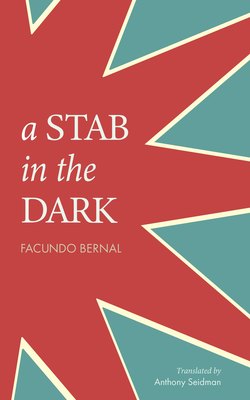Читать книгу A Stab in the Dark - Facundo Bernal - Страница 2
На сайте Литреса книга снята с продажи.
ОглавлениеAcclaim for A Stab in the Dark
Bernal wants to purify, he wants to whip with his “palo ciego,” his rough-cut blindness, his piercing pen-point that refuses the cultural slippage of a new kind of Mexican. In desperation, it seems, on a mission, Bernal documents his journeys through a morphing early 20th-century intra-nation: “Angelópolis,” Mexicali, and points in between. The “authentic” dissolves in “Yankee-landia,” yet it is also fused in a revolution poetry of his own — multi-voiced, odd-angled, born at the intersections of borderland lingo, personas, and formats. A profound forerunner and city street-news poet of a Latinx word howl to come. Ground-breaker, research-maker, prize igniter for a time of brave new chaos.
— Juan Felipe Herrera, U.S. Poet Laureate Emeritus
A wildly energetic journalist-writer with satirical wit, a side-order of machismo, and a lifelong distrust of politicians, Facundo Bernal might be compared to Ambrose Bierce, author of The Devil’s Dictionary, who disappeared into Mexico during the very revolution that forced the younger Bernal north across the border. Bernal may not be a great poetic innovator, but he is a brilliant documentary versifier whose small body of work takes on a whole new life in Seidman’s fabulously resuscitative translations. Bernal delivers the sounds and images of a critical epoch when a large number of Mexicans were making new lives (and a new idiom and culture) in California. His poems are caricatures, dramatic monologues, provocations. And they are also a glorious record of theater reviews, bank foreclosures, headlines, the advent of radio, immigrant labor, and overheard talk at carnivals and in dance halls. Bernal has a keen ear for the very alive, vernacular voice of that moment, when the City of Angels was begrudgingly adjusting to its immigrant-ushered reinvention.
— Forrest Gander, poet and translator, author of
Core Samples from the World
¡Újule! Míster Blind still sweeps the world with his “palo de ciego,” his blindman’s cane. Facundo Bernal’s verbal theatrics, his biting insights, his astringent and truthful voice, his irreverent humor, and his great love of who he is — a Mexicano in a time when being one is both a challenge and a joy — cover as much ground today as they did in the 1920s. Then is Now: immigration, displacement, racism, the hatred of the refugee, the power of the rich, the voiceless poor, “los bichis del gud taim.” ¡Cheeses Cries¡ Yankee-landia will never be the same. We needed Facundo Bernal more than ever.
— Denise Chávez, Fronteriza writer, author of
The King and Queen of Comezón
